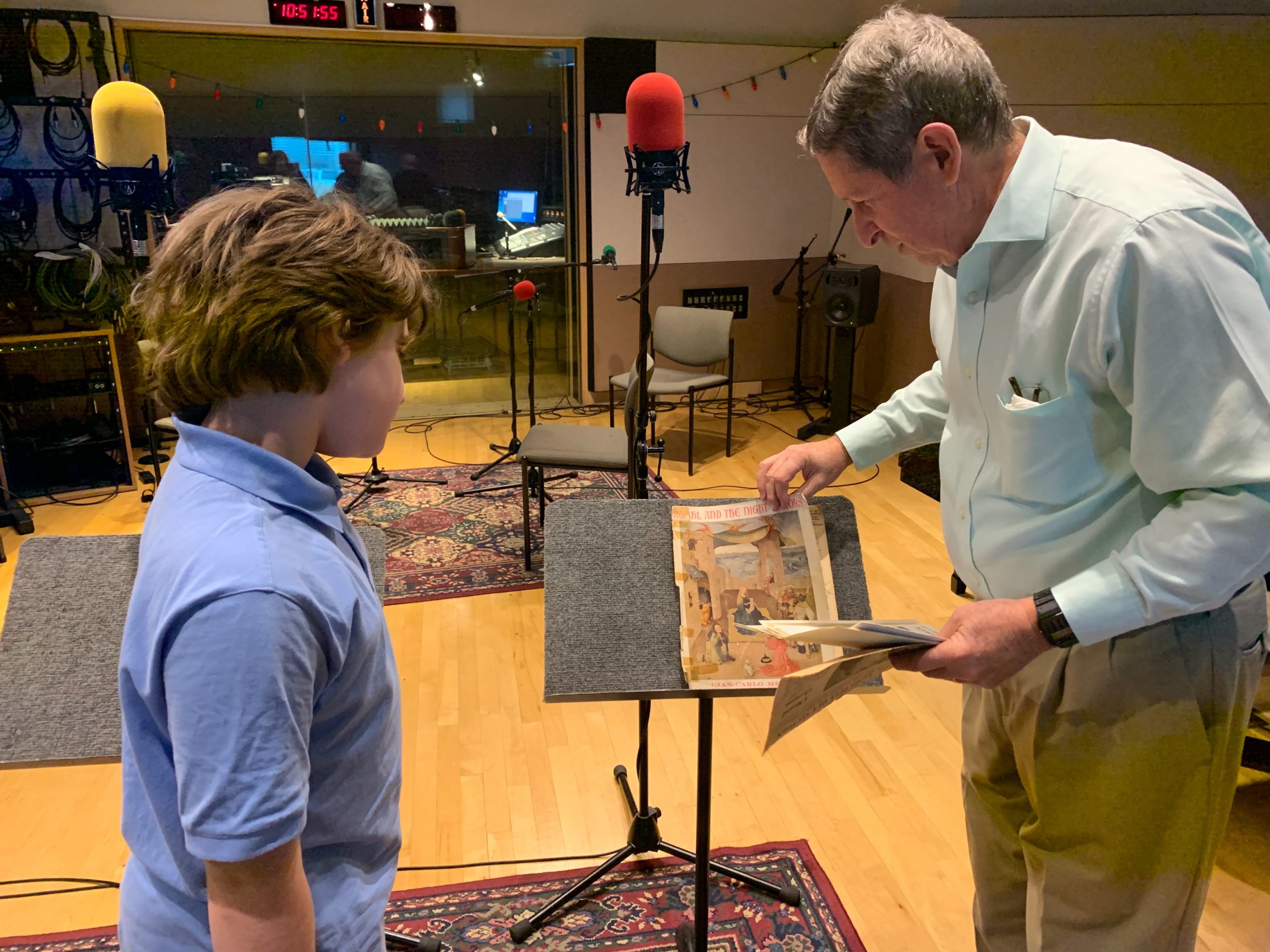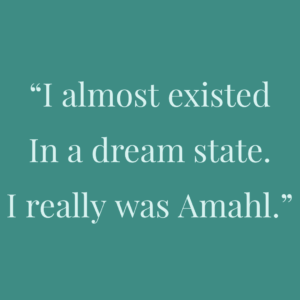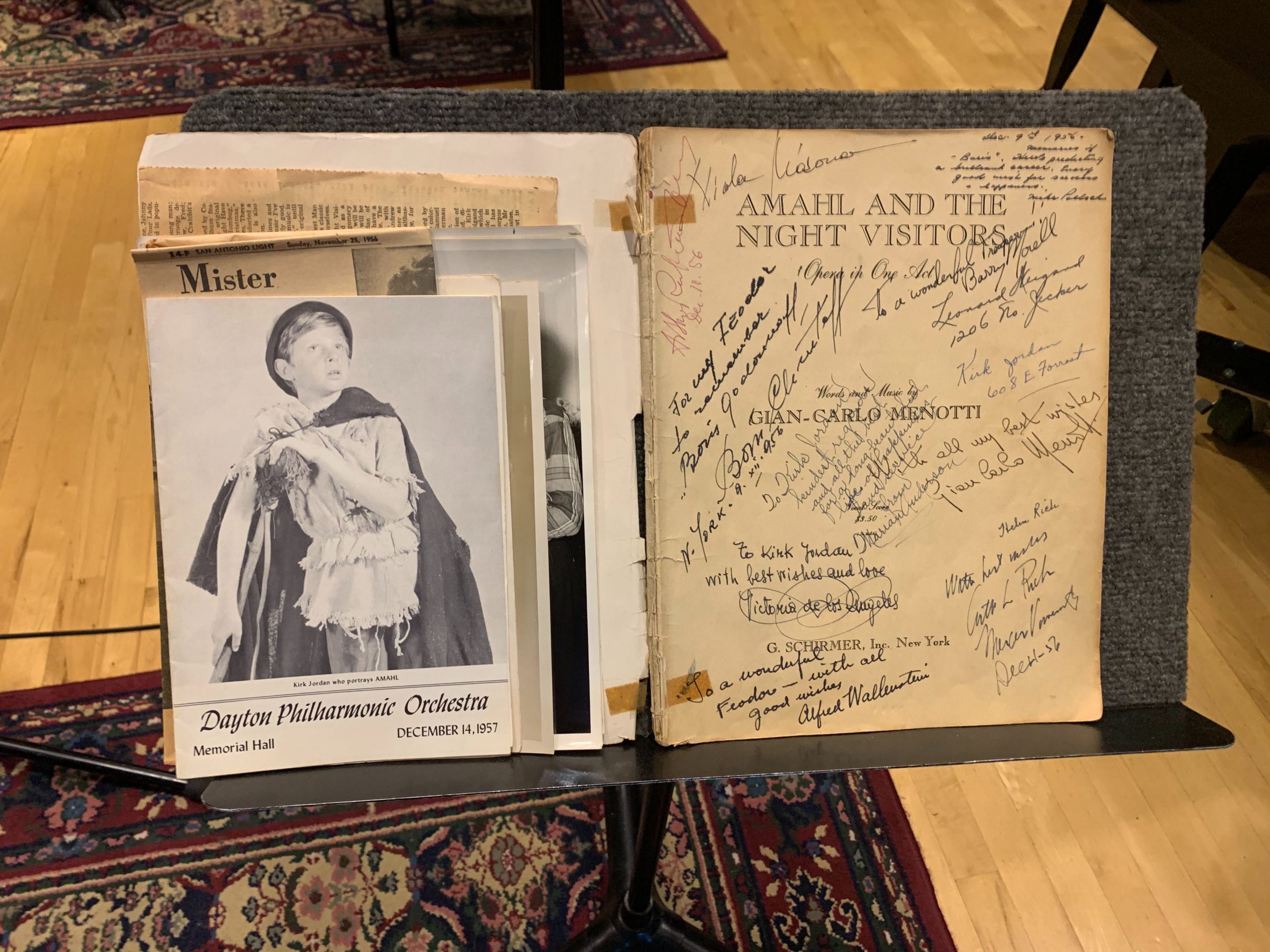
Family of Nashville resident Kirk Jordan got in touch with 91Classical when we began promoting our presentation of Gian Carlo Menotti’s Amahl and the Night Visitors in partnership with Nashville Opera on Live in Studio C. Jordan had played the title role on NBC every Christmas Eve from 1956-1958, and his performance was rebroadcast for another six years after that.
We invited Jordan to join us for the broadcast, and he even agreed to come early to tell us about the experience. The full interview is available for listening above, and we’ve shared a transcript below.
More: The Tale of Amahl: How A Childhood Memory Was Broadcast To An Audience Of Millions
How did you end up in the role of Amahl?
Well, I was in a grade school choir, fifth grade, and my teacher from New York knew that Billy McIver – the current, in 1955, Amahl – was growing tall and lean, approaching puberty. I wasn’t. I was only ten, or nine at the time. My mother was quite a gifted pianist. We made a tape of her playing songs that I sang, some of which were from Amahl, and we sent those off to NBC. “Menotti, in care of NBC.” We really did. We were pretty unsophisticated in terms of how to get hold of people.
That happened in February of 1956 and I began working very diligently on the score. You can see my dog-eared score as pretty much evidence of that. In October, out of the blue, we got a letter from Menotti asking if we were still interested. And then two weeks later, they sent plane tickets for my mother and I to fly to New York for an audition in November. They had already winnowed down a field of people, and I was the outsider candidate, if you want.
So I was in a very stiff competition for all day long. An eight hour competition. At the end of that, I was fortunate enough to be selected.
It’s a rare little boy who would dream of being in an opera at that age. I guess once you get to New York, it starts to feel really intense. But how emotionally attached were you to the idea of being Amahl at that point? Or if you hadn’t gotten it, would you have kind of thought, “OK. Free trip to New York?”
You know, I think it’s the latter. I think as adults, we overthink what children are thinking. My mother had the weak knees. After I won she, in the hotel room, I remember we had worked so hard to get there. And for me, it was just the next step, you know? Of course, I’m going to win. This audition never occurred to me that I wouldn’t.
So she asked me, “do you really want to go through this? It’s going to be a lot of work.” And I looked at her like she was crazy. And I said, my gosh, we’ve worked so hard for a whole year on this. We’ve just achieved the goal. Why in the world would I rethink this? So I suspect that as adults, we overthink what a child is imagining.
Players on Live in Studio C have told me, and I’ve experienced it, too, that the lack of applause when they finish a piece in a studio setting for a live broadcast, after being used to being on stage, is really disconcerting. Do you remember feeling that way during an Amahl broadcast?
I remember in the first Amahl, ’56 that I almost existed during that hour in a dream state. I was really Amahl. I wasn’t performing for another group. So for me, the lack of an audience wasn’t a factor. I was Amahl for an hour.
You toward the piece as well. And to look at the program of some of those concerts on tour. It sounds like a punishingly difficult concert. I saw somewhere you sang the soprano solos from Handel’s Messiah, part one.
Yes.
And then performed all of Amahl in the second half. Did you feel like it was hard at the time?
Oh, it’s a matter of youth. You know, at that point, your voice is strong. And, you know, I just always I can remember one time I sang on literally a pile of boxes. The tenor solo is usually Comfort Ye. So that’s when I sang and it introduced the Messiah for the oratorio session.
I came out – the regular adults were singing in front of the curtain – and I had to come through the center of the curtain and stand up high as though I were an angel saying Comfort Ye. And I literally was standing on a pile of boxes, walking out and standing in between the closed curtain.
And so, for me, if there was a time when I felt ill-at-ease physically, that was it, because I could have fallen off this darn thing. But I never felt that I was over-singing. I always enjoyed singing. And when you’re young and enthusiastic and you love what you’re doing, you can go a long way.
What was the studio experience like?
I had actually been in some little studios in Galveston on a very little local show, but those were on the ground push cameras and they were big, but they were on the ground.
In the first Amahl show they introduced these boom cameras. At least I was introduced to them and they were intimidating because they were huge and they were just above your head, just out of sight. And, you know, they were also competing for airspace with the boom microphones.
So it was perhaps advantageous that I was in this kind of dream state in that I was so much Amahl that it never occurred to me to look at what was going on around me. I think kids have the ability to focus on their environment and be lost to the rest of the world. And that was an advantage, I guess.
You said that you never felt like you were over singing. Did you work hard on taking care of your voice or did it just come naturally?
Well, I grew up in a family that sings all the time. My mother was a concert pianist. She was the concert pianist in Kansas City at Kansas City Light Opera. And I just think that we sang so much that we built a vocal endurance.
Also, it did take care of my voice, but I never really had formal voice lessons. We just sang a lot and listened to good music.
What was Menotti like?
Well, he was a god for a 10 year old. I knew he had written this music. I loved, from the very beginning, the way he built lyrics into the music rather than the other way around. But for me to meet him and work under him, he was an active director. It was just an amazing experience.
I was nobody from nowhere. And Gian Carlo Menotti was this marvelous, you know, Pulitzer Prize winning, probably the most prominent composer of his day in the United States. You know, even though he was Italian, we claimed him. So it was wonderful working under mine. He was very patient with a young, inexperienced actor on stage.
Note: Gian Carlo Menotti and Samuel Barber were known to have been in a long-term relationship. Barber played an active role in helping to get “Amahl and the Night Visitors” ready for broadcast, and Barber’s “Adagio for Strings” was used as the music for the closing credits for the broadcast in 1956.
Did you get to meet Samuel Barber?
No. I actually didn’t know that there was a connection. I knew of some of Samuel Barber’s music at that time. I remember some of his music I didn’t like at all. I always liked lyrical, singable music. And some of Barber is just more modern. It wasn’t Hindemith, but it was bordering going in that direction.
Tell me what you said about Adagio for Strings, though.
First of all, I didn’t associate it with Samuel Barber at that time as a 10 year old. I just knew it was a beautiful piece of music.
We the first year we were introduced by a New York columnist named Arlene Francis. And at the end of the show, Arlene was just in tears and barely able to get through her closing of the show. And then they then, you know, the credits were run in those days. Credits were written on cards. And there were there were two cameras and they would show one name and then they would switch to the other camera, show another name, and somebody would pull off the first card. And it’s going back and forth.
So there was a lot of busyness going on. But Samuel Barber was playing in the background. And there’s Adagio for Strings with the star as a vision as it was on the camera. It was just striking into a beautiful opera and very, very emotional.

Kirk Jordan (right) shows his original score to Alan Harrisohn Foeder, playing the role with Nashville Opera in December 2019Colleen Phelps91Classical
Do you still love opera?
I do. I was introduced to grand opera by a friend of mine in Victoria who took us to Houston. And we went to Aida, which is a wonderful opera to start with, and also tour. And so, you know, there’s lots of fanfare, but the music, of course, is just so amazing.
So I still love opera. I don’t see as much of it as I would like to. But now in retirement, I’ll probably get an opportunity to do more.
What do you want to tell any boy who takes the role of Amahl?
Well, it’s a wonderful, inspirational role. It’s rare that a boy of, you know, pre-teen pre-puberty gets to have a role in which he is the title character. I mean, that’s pretty amazing. I think that child should just enjoy the moment and enjoy the associations that come from it. That’s it’s a real blessing. Most kids don’t have that.
Most boys, especially when you’re growing up and trying to find yourself and establish who you are, it’s nice to have that identity as you have. It’s like being a star quarterback or something. You have this identity that you take with you. And as long as you do it with a sense of humility and with a sense that you’re a pretty lucky guy, then Amahl is a real stepping stone and a real vehicle for establishing yourself as a person. I think Amahl is just beautiful music. And it’s again rare that a boy of 10, 11 and 12 has a starring role.
You mentioned to me other operatic roles that you sang and other oratorio pieces that you sang. What sticks out is your favorite?
In 1956, NBC was looking to publicize and capitalize on its success with them all and the night visitors and they had a new Amahl. They were looking to establish credentials. So a couple of weeks before Amahl was done that year, right at Christmas time, about the 10th of December, there was a program that ran monthly, I believe, called Producer’s Showcase.
Producer’s Showcase was something that would have to be on public television today in order to get the audience, in an hour segment. There were four quarters that were divided into completely different segments, unrelated. And I sang in the opera, Boris Gudonov as the Prince Theodore in a very limited role, but one that gave it was a kind of almost a cameo or a publicity publicity opportunity for NBC.

Kirk Jordan’s headshot and autographed score of “Amahl and the Night Visitors”Colleen Phelps91Classical
And so I sang that role and that was so amazing because also on that show, I got to meet Arturo Rubinstein, and Victoria de los Angeles who was a Met soprano, and also Marian Anderson. So it was a star filled show. And then there was us and the man who sang the basso-role of Boris Gudonov, the czar, was a fellow named Boris Christoph, who is not well-known today. But in those days, he “was” Boris Gudonov. He was the preeminent Boris Gudonov.
So I guess it gave me a sense of perspective as a Texan having won this role, I just thought, “well, you know, this is another role.” But suddenly I was rubbing shoulders with some names that I just thought were, you know, gods. And so it gave me a sense that, well, maybe this is kind of important. It was fun.
Enjoy Nashville Opera’s performance of “Amahl and the Night Visitors” in the “Live in Studio C” archive. 91Classical’s special programming for Christmas Eve begins at 9am on December 24.